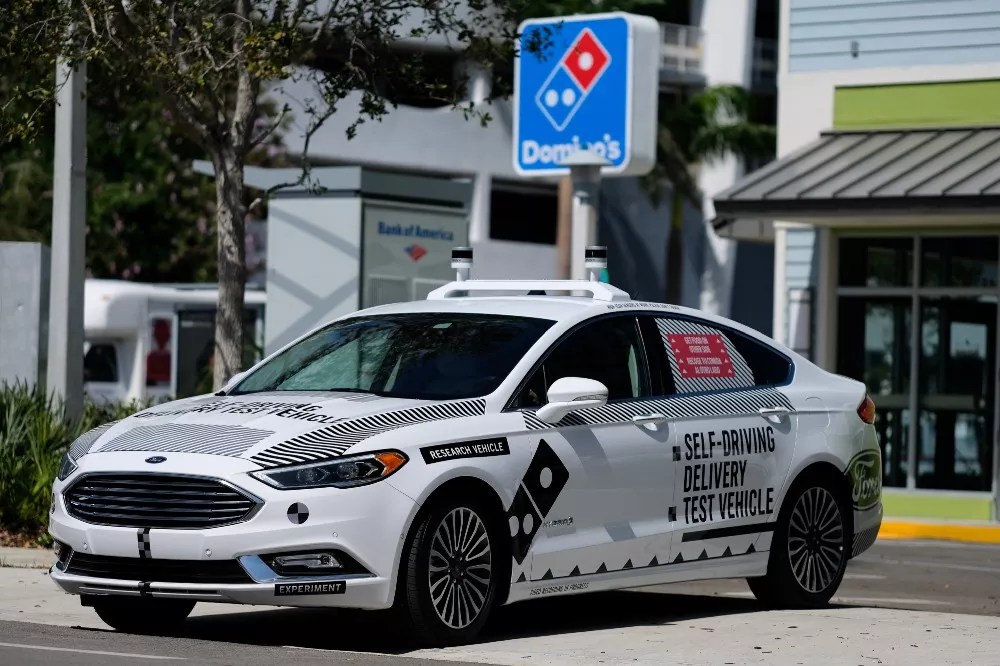
Courtesy of Ford

Audio By Carbonatix
People who deliver pizza in Miami live in the
Today, Ford Motor Company, Domino’s Pizza, the “gig-economy” food-delivery service Postmates, and Miami-Dade County gleefully announced a plan to replace those people.
In a PR release, Ford said it’s partnering with Domino’s and Postmates to test autonomous, computer-piloted food-delivery cars throughout the Miami-Dade metro area. Ford says the cars are already on the streets driving among us – a potentially cool idea if not for the fact that every single robot-car takes the job of a breathing delivery worker with bills to pay.
Ford’s announcement is an exercise in PR-industry wizardry. Ford has pitched the plan as a way to test whether autonomous vehicles can fix a city’s traffic woes, but in reality, the company seems to just be doing major delivery companies a solid by helping them test whether driving pizza around using robots will be cheaper than human labor. Ford admitted as much today.
“A self-driving vehicle won’t need to be tipped, and it won’t park illegally,” Ford’s PR materials brag. A video Ford released also mentions the cars will give Miamians more “ride-sharing options” in the future – in other words, robots will likely begin competing with Uber and Lyft drivers for jobs soon.
Miami-Dade County Mayor Carlos Gimenez has trumpeted the idea that self-driving cars will ease traffic problems – even though most urban-planning analysts agree autonomous vehicles won’t fix poor urban-planning issues or cut congestion. Ford appears happy to capitalize on Miami’s painful lack of
“Miami was recently listed as the tenth most congested city in the world, according to the Inrix Global Traffic Scorecard, and the fifth most congested city in the United States,” Ford announced. “That’s just not right, yet it serves as a reminder that people always need to be at the center of our plan, so we’re setting out to solve
Ford’s pilot program seems far less likely to help Miami drivers than to aid corporate billionaires who don’t want to pay poor people to drive pizzas around town. A promo video Ford released today showed a Domino’s customer walking up to a
“Another way to think about it is to consider the costs of convenience,” the PR release reads. “Today, deliveries can be made to someone’s door, though there is usually an extra charge involved. Oftentimes, drivers illegally double-park when they can’t find a space, potentially causing traffic congestion for others.”
Proponents of job automation argue that when robots take over jobs, new service jobs sometimes open to fill the employment vacuum the robots leave. For what it’s worth, Ford says it’s also opening a
Uber, Lyft, and cab drivers for years have been worried about the proliferation of self-driving cars: Uber is hemorrhaging close to $5 billion per year in losses, and most Silicon Valley insiders assume the company is biding its time and intentionally undercutting taxi prices until the app can run a fully autonomous fleet with zero labor costs. (Uber has been testing the cars in cities such as Pittsburgh for a while, sparking anger from drivers.)
Partially out of fear that robots will one day put them out of work, many Uber and Lyft drivers have joined the national “Fight for $15” union movement to demand a national minimum-wage increase. It’s hard to blame them, because companies such as Ford and Domino’s don’t seem too worried about what their new tech will do to jobs in the future. New Times reported last year that the value of taxicab medallions has plummeted since Uber and Lyft became successful.
“The development of self-driving vehicles hints at a whole new way of moving people and goods,” Ford writes, “but it doesn’t change our way of doing business – placing the customer above all else.”